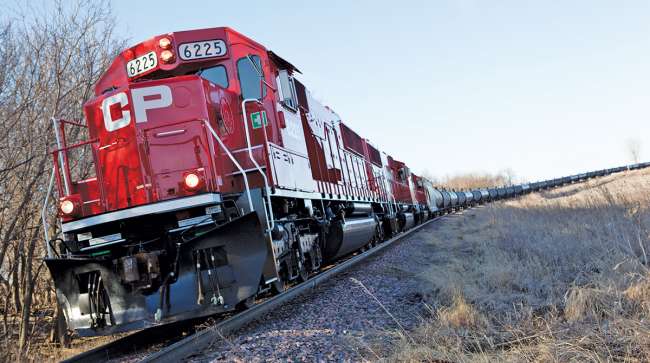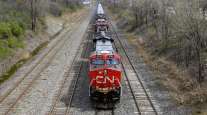Senior Reporter
Canadian Pacific Posts Q1 Earnings, Discusses Rival Bid for Kansas City Southern

[Stay on top of transportation news: Get TTNews in your inbox.]
Canadian Pacific officials aggressively defended their planned $25 billion acquisition of Kansas City Southern, announced in March, during a conference call April 21 regarding first-quarter earnings.
The day before, rival Canadian National Railway made a competing bid for Kansas City Southern.
Canadian Pacific CEO Keith Creel spent 25 minutes going through a point-by-point analysis of the competing bid and spelling out why a Canadian Pacific-Kansas City Southern merger is a much better deal for the railroad’s customers, shareholders and employees.
“Based on the merits, the facts of our case, our combination, the CP-KCS is the only true USMCA network opportunity, Class I combination that answers the STB public interest test,” Creel said, referring to the Surface Transportation Board. “It’s pro-competitive. Multiple fronts, new routes, new markets, new competition introduced. Customers get reached today with this combination, when approved and we believe it will be, that quite frankly without it is impossible.”
Canadian National’s unsolicited bid is substantially higher, at $33 billion, than Canadian Pacific’s $25 billion cash-and-stock offer. CP's bid also includes the Calgary, Alberta based-company assuming nearly $4 billion of Kansas City Southern’s debt.

Creel
Transportation economist Paul Bingham told Transport Topics in March that as the smallest of the Class I railroads, Kansas City Southern is extremely attractive, because it’s the only railroad that operates deep into Mexico. Last year, the U.S., Mexico and Canada ratified a new trade treaty, the United States-Mexico-Canada Agreement, which is expected to have a long-lasting impact on trade between the three nations, especially as it relates to agriculture, automotive production and a list of other items.
Creel said with economists forecasting the U.S. economy is likely to rapidly ramp up this spring and summer, he is optimistic Kansas City Southern is in a good position to grow.
Canadian Pacific’s net income climbed 47% to C$602 million, or C$4.52 a share, compared with C$409 million, C$2.99, a year ago.
The results exceeded Wall Street expectations. The average estimate of six analysts surveyed by Zacks Investment Research was $3.47 per share.
Revenue declined 4.1% to C$1.95 billion from C$2.04 billion in 2020.
The railroad’s operating ratio worsened to 60.2 from 59.2 in the first quarter of 2020.
Operating ratio, or operating expenses as a percentage of revenue, is used to measure efficiency. The lower the ratio, the greater the company’s ability to generate profit.
Revenue across the railroad’s various business sectors was mixed.
Grain revenue showed a 7.1% increase to C$448 million from C$418 million.
Coal revenue increased 8.6% to C$163 million from C$150 million. Potash revenue dipped 9.2% to C$101 million from C$112 million.
Fertilizer shipments were up 10% to C$77 million from C$70 million.
Forest products inched up 2.5% to C$80 million from C$78 million. Energy, chemicals and plastics shipments declined 26.5% to C$388 million from C$491 million.
Metals, minerals and consumer products fell 18.8% to C$159 million from $C189 million.
Automotive shipment revenue increased 24.1% to C$108 million from C$87 million.
Intermodal revenue declined 2.7% to C$394 million from C$405 million.
Before the earnings announcement, Canadian Pacific officials wrote the Surface Transportation Board urging a close review of the rival offer from Canadian National, saying it would hurt rail competition throughout the central United States and could destabilize the balance between the industry’s six largest players.
“Canadian Pacific respectfully suggests that the board should see things the same way: The only combination involving KCS that is in the public interest is the one that Canadian Pacific has proposed, and which has already garnered support from over 400 shippers and other stakeholders,” Canadian Pacific’s attorney, David Meyer, wrote.
However, Canadian National has said its bid is better because it creates a stronger network combining with Kansas City Southern and there is more cash for shareholders.

Even at Level 4 autonomy, self-driving trucks will have technical limitations. In this episode, we ask how technology developers are clearing those hurdles to make autonomous trucking a reality. We bring in Boris Sofman, head of engineering for the autonomous trucking program at Waymo. Hear a snippet above, and get the full program by going to RoadSigns.TTNews.com.
It has been more than 20 years since the Surface Transportation Board approved a major railroad merger and it had said in the past when considering a deal involving any of the major, Class I railroads that the agreement must enhance competition and serve the public interest to win approval.
During the past two decades, the major railroad industry has been stable with two railroads in the western United States, Burlington Northern Santa Fe and Union Pacific; two in the east, CSX and Norfolk Southern; and the two Canadian railroads that serve Canada and the United States.
Want more news? Listen to today's daily briefing below or go here for more info:


